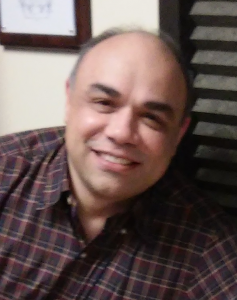 Dr. Behrooz Mirafzal, an Associate Professor of ECE department at KSU, received his PhD degree from Marquette University in 2005. From 2005 and 2008, he was with Rockwell Automation/Allen-Bradley, Mequon, WI, as a Senior Development/Project Engineer, where he was involved in research and development related to motor-drive systems. From 2008 to 2011, he was a faculty member at Florida International University, Miami, FL. Since 2011, he has been a faculty member at Kansas State University, Manhattan, KS. Dr. Mirafzal is the recipient of the 2008 second best IEEE-IAS Transactions Paper Award for a paper published in 2007, the best 2012 IEEE-PES Transactions Paper Award for a paper published in 2011, a 2012 NSF EPSCoR First award, and a 2014 NSF CAREER Award. He also received an innovation award from Rockwell Automation in 2006. Dr. Mirafzal has served as the technical co-chair of the IEEE IEMDC International Conference in 2009, NAPS Conference in 2013, an associate editor of IEEE Transactions on Industry Applications since 2011, and an IEEE Senior member since 2007.
Dr. Behrooz Mirafzal, an Associate Professor of ECE department at KSU, received his PhD degree from Marquette University in 2005. From 2005 and 2008, he was with Rockwell Automation/Allen-Bradley, Mequon, WI, as a Senior Development/Project Engineer, where he was involved in research and development related to motor-drive systems. From 2008 to 2011, he was a faculty member at Florida International University, Miami, FL. Since 2011, he has been a faculty member at Kansas State University, Manhattan, KS. Dr. Mirafzal is the recipient of the 2008 second best IEEE-IAS Transactions Paper Award for a paper published in 2007, the best 2012 IEEE-PES Transactions Paper Award for a paper published in 2011, a 2012 NSF EPSCoR First award, and a 2014 NSF CAREER Award. He also received an innovation award from Rockwell Automation in 2006. Dr. Mirafzal has served as the technical co-chair of the IEEE IEMDC International Conference in 2009, NAPS Conference in 2013, an associate editor of IEEE Transactions on Industry Applications since 2011, and an IEEE Senior member since 2007.
Dr. Mirafzal has established a power electronics research group with a relatively modern laboratory in the Department of Electrical and Computer Engineering at Kansas State University. His group is working on utility-interactive solid-state-based power converters, specifically the technical challenges that must be overcome for integrating more sustainable energy sources into the existing energy infrastructure. The group currently consists of 1 Postdoc/Visiting Scholar, 4 PhD and 1 MSc students. The group is working on three main research topics.
The first research focus is on an innovative single-stage three-phase boost inverter applied to wind and solar energy conversion systems. The work on this topic was started in 2010, and two of the former graduate students (Dr. A. K. Kaviani (PhD) and Mr. A. Milani (MS)) and one of the current PhD students (Ms. A. Singh) have been working on this topic since 2010. The single-stage boost inverter provides a relatively high boost ratio in a single stage, with no need for a cascaded dc-dc boost converter or a step-up transformer. The boost-inverter requires few solid-state switches, eliminates the need for dc-bus electrolytic capacitors, and reduces the complexity of control systems. Besides reliability benefits, the boost-inverter can make the grid-tied renewable energy systems more robust than conventional inverters in the presence of external faults. So far, the research findings have been published in 11 IEEE conference proceedings and transactions which have been cited by more than 80 other publications. This work has been extended into the direct-drive wind turbines and the preliminary results are very promising.
The second research focus is on dynamics and stability analysis of grid-connected VSI. Two of the former students (Mr. D. S. Ochs and Mr. F. Alskran (MS)) and one of the current PhD students (Mr. A. Adib) have been working on this topic since 2012. The renewable energy sources produce energy in forms not suitable for direct connection to the power grid. In a highly adaptable grid, utility-interactive inverters should be able to provide power to both local loads and the power grid. Under abnormal conditions, the grid can be disconnected, and the local loads should be energized by the inverters. A new methodology has been developed that allows a three-phase grid-tied inverter to move from grid-tied to stand-alone mode and vice versa, with smaller transient times and overcurrent magnitudes than previously reported techniques with only one set of sensors. Furthermore, large-signal and small-signal dynamic models of VSI have been developed which were then used for stability analysis on circuit parameter variation.
The third research focus is on generating knowledge necessary for the creation of a framework that integrates reconfigurable grid-tied inverters with two adaptive supervisory controllers: a diagnosis supervisor and a reconfiguration supervisor. Two of the current PhD students (Mr. J. Lamb and Mr. K. Alboaouh) have been working on this topic since 2013. This work has the following advantages: (i) forming a new family of solid-state-based power converters with diagnostic, self-healing, and lifetime prognostic features, (ii) improving grid-interactive converters reliability by preventing catastrophic failures and mitigating stress on vulnerable components, and (iii) reducing overall system downtime and maintenance costs.
Other activities include: (i) a laboratory-scale wind-turbine emulator that is coupled to a permanent-magnet generator in the power electronic research laboratory has been built using equipment donated by Rockwell Automation. The setup is unique because the generator was rewound with several taps in each phase such that the incipient internal faults can be modeled, and (ii) a technique for rapidly implementing switching patterns and control schemes for power converters has been developed by one of the PhD students (Mr. J. Lamb). This technique provides an easy-to-use laboratory allowing students to focus on reinforcing the theory learned in energy conversion, motor-drive, power electronics, and power system classes while still providing instructors with the flexibility to design a wide range of educational experiments.